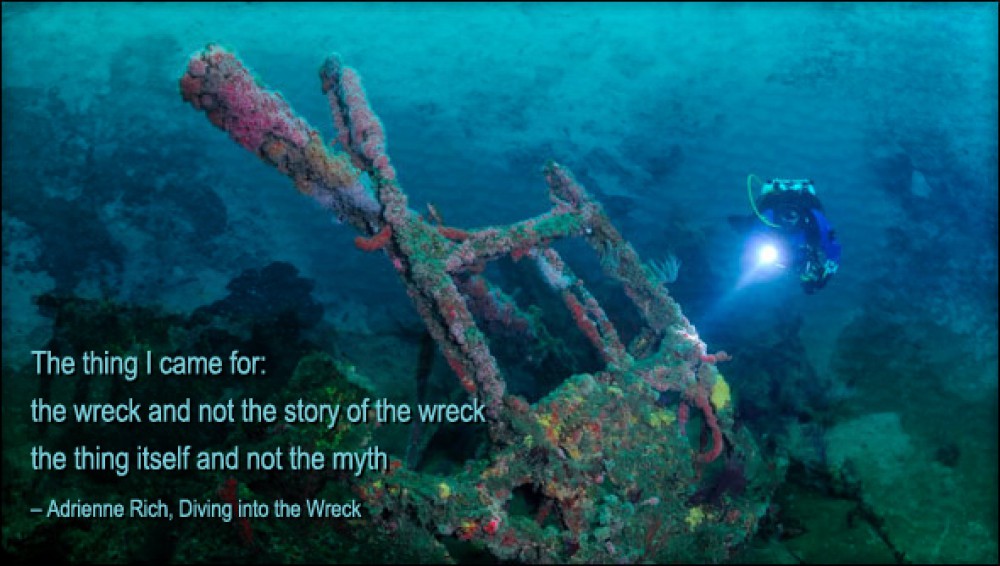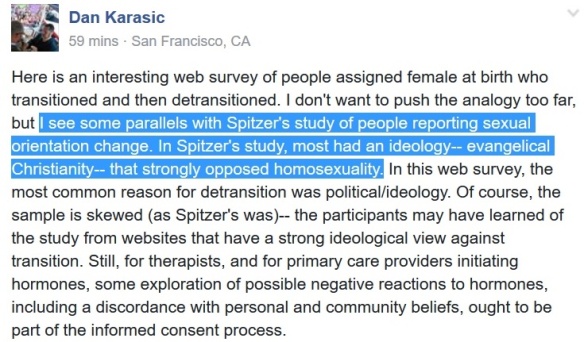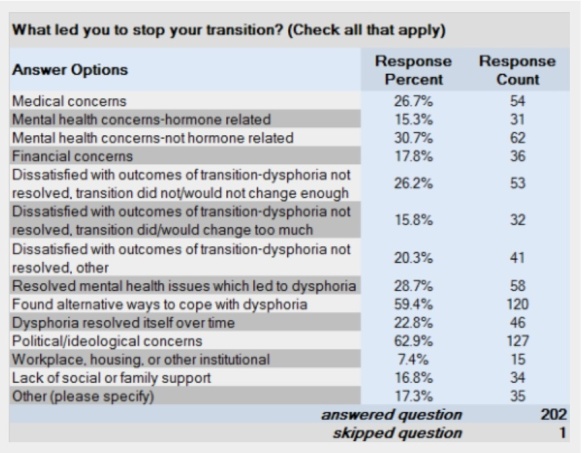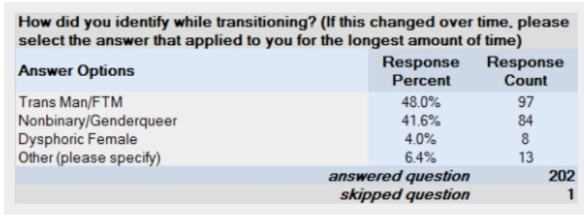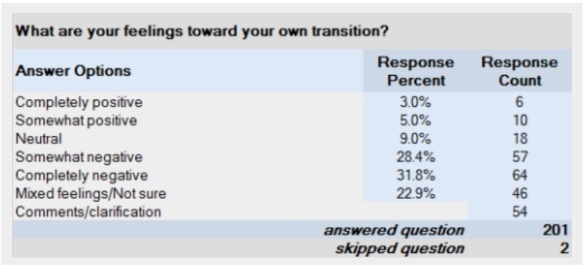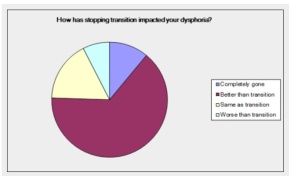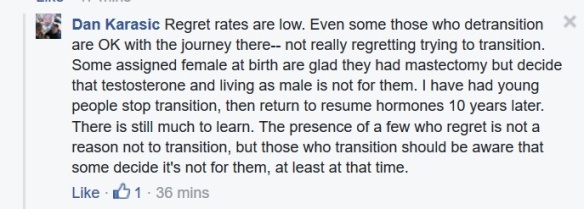by Jenny Cyphers
Jenny Cyphers is a homeschooling parent. She has been writing about that experience for many years, in various online forums. Jenny has been married for 24 yrs to the father of their two children, one adult and one teenager. They all live, work, and create, in Oregon. Jenny and her teen daughter were recently interviewed for an article about gender-dysphoric youth in The Atlantic.
4thWaveNow editorial note: We are grateful for Jesse Singal’s reporting on this complex issue and appreciate that he included the seldom-heard voices of teens who desisted from a trans identity, and their parents, in his article. We are aware that in some circles, the discussions we host on our site are considered transphobic and that we, a loosely-organized group of parents writing on this site, have been defamed as a “hate group” by those on the extreme end of the activist spectrum.
As always, we encourage those interested in the issue to read as widely as possible so they may come to their own conclusions. We contend that by leaving out all mention of 4thWaveNow, The Atlantic not only failed to offer parents the alternative opinions and resources we offer, but they also contributed to an environment that, due to censorship of critical voices, continues to propagate the distorted idea that cautiousness around medical interventions for minors is inherently harmful to trans-identified people in general.
I knew, when I agreed to be interviewed for The Atlantic article “When Children Say They’re Transgender,” that some of my words might be cut, or changed in ways I didn’t intend. But Jesse Singal is a good journalist. He’s personable and honest and willing to take on some really difficult subjects. He digs deep, records, researches, cites sources and ties things together in a nuanced way. Along with editors, he carefully adds and discards words, phrases, sources, quotes, and relevant ideas that lend themselves to the overall picture of what people will read and take away from what they’ve read. That’s what good journalism is.
There are a few things about our story and the way it was presented in The Atlantic that I’d like to clarify. First and foremost, the last-minute editorial decision to unlink the essay “A Careful Step into a Field of Landmines,” I’d written for 4thWaveNow, combined with removal of all mention of the site, needs to be highlighted because in doing so, The Atlantic failed to include important resources created to help parents support their gender dysphoric and nonconforming youth. The result is an article focused on the “situation” of “trans kids” that obscures parent-led examination and support for youth to explore identity without harmful medical interventions, the consequences of which can last a lifetime.
There are more choices for families than to either support their teens’ requests for pharmaceuticals and surgery on the one hand, and disowning or otherwise invalidating their interest in exploring their identity and nonconformity on the other. The Atlantic editors’ choice to remove 4thWaveNow from the discussion in effect denied parents access to important analysis that offers a balanced and middle ground.

The Atlantic photo editor had to dig deep in the several photos we provided to find the pensive one they chose for their article. Here’s one my daughter likes better; she suggested it be included with this post.
Part of my agreeing to contribute to this important debate is helping to create a platform. This website is such a platform. In talking with Jesse, I was upfront about my beliefs, which in part have been informed by 4thWaveNow and the great many array of voices shared here. It isn’t a monolith. Some of us are very liberal, left-leaning people in liberal left-leaning parts of the country, doing liberal left-leaning activities. Some of us are middle-of-the road, a minority of us are conservative, some of us are doctors, therapists, professors, and teachers. Some of us have allowed full social transition to give space to figure things out while still not agreeing to medical transitioning, and some have not. Excluding mention of 4thWaveNow, a site that gets 60K hits a month, fails to tell the whole story. Why do that? Why leave out one of my main sources of information and the ways that information helped me help my child?
Two of the most important aspects of my family’s experience that are not adequately addressed in the Atlantic article, are: 1) my daughter was given a clinical diagnosis of gender dysphoria, so she was just as “truly trans” as the next kid, and 2) it was my insistence that my child wait to medically transition, not her therapist’s. My teen’s therapist, Laura Edwards-Leeper, listened to me and agreed. We were lucky. While there are some cautious, thoughtful providers, the current situation in the US is that there is also no oversight. The most vocal professionals are firmly in the affirmation camp which believes, without any long-term data to validate, that withholding hormonal interventions is tantamount to abuse.
I didn’t know, going into Delta’s first appointment, what the outcome would be. That’s how difficult this is for parents; we have no idea what the outcome will be when we have very “insistent, consistent, and persistent” children requesting immediate medical interventions. It’s a matter of luck to find a therapist who respects parents’ knowledge of their children, who takes parental concerns and insights seriously, and who are not afraid to support slow, cautious progression.
While many transgender activists argue that they understand our children better than we do, there is no evidence to support their claim. Rapid Onset Gender Dysphoria is seen primarily, although not exclusively, in natal females during puberty. It is important to understand that what separates my daughter and many of the kids of 4thWaveNow parents, is this: None of these kids experienced distress over their sexed bodies until they came into contact with the idea that there might be something wrong with them. In other words, the dysphoria is what was “rapid onset,” not necessarily their gender atypicality. These are not kids with “early-onset,” nor do they resemble later in life transitioning people who frequently claim to have always “felt like” a girl but were too afraid or oppressed by family dynamics to admit their feelings. Then, making wide sweeping projections of their own experiences, they mark our children as being in need of the help they believe they should have had. With our kids, as with the group of young people described in Lisa Littman’s survey where ROGD was first named, their dysphoria set in quickly during puberty, often after spending hours online watching/reading others discuss their distress.
Another outlandish claim (made repeatedly by some activists and “affirming” clinicians) is that we simply missed all the signs our children were suffering earlier. I can assure you that, as a homeschooling mom who spent all day every day with my daughter, she never thought she was or wanted to be a boy prior to encountering the idea from transgender kids in her social circle. In fact, between ages 9-11, she was often “misgendered” (referred to as “he” or “him”) and hated it. It saddens me that these activists experienced such awful childhoods. However, their childhoods seem to have been negatively influenced by the religious fundamentalism and/or abusiveness of their parents; their childhoods do not remotely resemble the experiences of my daughter or the many other young people experiencing ROGD whom I’ve met.
 Teens and tweens with ROGD often meet all the clinical diagnostic criteria for transitioning. They are often “insistent, persistent, and consistent” for more than six months, or in our case, for two years. Teens with ROGD also typically meet the clinical threshold for gender dysphoria, as mine did. It’s in her medical file. That’s correct, my “never really trans kid” had a clinical diagnosis of gender dysphoria under the DSM-V. This is what we hope others understand: our kids are suffering, they hate their bodies, they want and need help. In many cases, our kids had trouble making friends, experienced some form of earlier trauma, and struggle in other important ways, completely unrelated to gender, that should not be overlooked or seen as secondary to their dysphoria.
Teens and tweens with ROGD often meet all the clinical diagnostic criteria for transitioning. They are often “insistent, persistent, and consistent” for more than six months, or in our case, for two years. Teens with ROGD also typically meet the clinical threshold for gender dysphoria, as mine did. It’s in her medical file. That’s correct, my “never really trans kid” had a clinical diagnosis of gender dysphoria under the DSM-V. This is what we hope others understand: our kids are suffering, they hate their bodies, they want and need help. In many cases, our kids had trouble making friends, experienced some form of earlier trauma, and struggle in other important ways, completely unrelated to gender, that should not be overlooked or seen as secondary to their dysphoria.
I know, because I was in pro-transitioning parent support groups, that parents are going to “gender specialists” and demanding medical interventions for their children without thoroughly considering why their children feel the way they do. I know, because I’ve heard from parents, that some therapists will give the green light to medical pathways without addressing any mental health issues. Dr. Johanna Olson-Kennedy, who treats 900 youth at her LA clinic, is quoted in Singal’s article as saying that she “believes that therapy can be helpful for many TGNC young people, but she opposes mandating mental-health assessments for all kids seeking to transition.” As many 4thWaveNow parents and teens will tell you, this attitude denies young people the opportunity to deeply explore why they want to alter their bodies and shuts down learning about other non-medical means of managing their distress.
When I was approached to do an interview, I needed to carefully consider my motivation for doing so, and if I should agree to discuss my family’s situation at all. Ultimately, I agreed because people need to hear that there are other ways to support trans-identifying kids. Gender dysphoria is very real and it hurts. My child’s life wasn’t easy because of the intense pain of GD. I knew there had to be answers other than what I saw everywhere around me, that suggested agreeing to medical interventions was the loving and kind thing to do, and that these interventions were harmless and helpful. I agreed to be interviewed because I wanted to highlight for other parents that there are other choices: most notably, offering support (buying clothing, getting haircuts, using a new name, finding a decent therapist) while also saying “I don’t think there is anything incongruent about your body/feelings.” The Atlantic axed this part of our story, the part where parents can offer tremendous support for their children without ever setting foot in a gender clinic in search of medical interventions.
I used to be a lot more open to the idea of transitioning children, in part because I know and like many transgender people. It wasn’t until I found that in the US, girls as young as 13 are getting mastectomies, that I began to question gender affirming medicine. In the new genderist language it’s called “chest,” “top,” or “confirmation” surgery. It sounds so much nicer than a double mastectomy, almost positive and pleasant. Cutting healthy body parts off of children should not be a thing. Ever. That was the moment I decided I would never stop talking about this.
My part of the interview with Jesse Singal–although about my daughter–was really more about how to support, in general, a child going through this very difficult experience. It is challenging, if not impossible, to find places to discuss supporting teens as they explore their identity in non-medical ways. 4thWaveNow is the only US-based resource that allows this. We need to talk about how to support gender non-conforming kids; things like buying clothing from the boys’ department if you have a daughter, or buying girl clothing if you have a son. My part of the interview wasn’t aimed at kids, but at parents who really need more and better tools for helping their distressed children than the “transition or die” option. Without choices, how can people really make one? Pick one of the two? No thanks.
Someone asked me the other day why I care. Why can’t I just let people do what they want? The answer is really simple. As humans we are guided to protect our young. If our culture fails to do so, each of us have failed to protect our children. This is why there are laws against abusing children, laws preventing minors from smoking or drinking, laws to keep kids from driving, laws for educating children. We can argue against any one of those things, but the cultural “we” have agreed that this is for the good of protecting children from harm, and for promoting welfare. In the US, unlike in other countries, there are no laws or regulations about transitioning children. Until there are, this is up for debate and I’m weighing in.
The fact that so many parents are left with this narrative that there is only one right way to help a confused kid, is what drives a wedge between the parent and child, leaving children vulnerable to self-proclaimed internet “experts”, like Zinnia Jones, who are more than willing to validate their feelings, further dividing parent and child.
Look, I understand that there are some truly not-very-nice parents out there, but we should not be making policy around them. That’s the sort of thing that creates bad case law. Let’s assume that the vast majority of parents want what’s best for their children, even if they have no idea what that looks like.
I was even more puzzled about the Atlantic‘s last-minute editorial decisions when I saw tha t, not only was any mention of 4thwavenow scrubbed in the final version of the article, but a statement by Jones and reference to Jones’ website were included. Jones has written multiple screeds denying the existence of the rapid-onset dysphoria in adolescent girls that more and more people (including clinicians) are noticing. Further, Jones recommends (on Twitter) that young people secretly obtain puberty blockers online if their parents aren’t onboard.
t, not only was any mention of 4thwavenow scrubbed in the final version of the article, but a statement by Jones and reference to Jones’ website were included. Jones has written multiple screeds denying the existence of the rapid-onset dysphoria in adolescent girls that more and more people (including clinicians) are noticing. Further, Jones recommends (on Twitter) that young people secretly obtain puberty blockers online if their parents aren’t onboard.
Unfortunately, many therapists, and others invested in the transgender narrative, seem to be heavily influenced by activists like Zack Ford, an opinion writer for the website Think Progress who, in response to Singal’s article, enunciates the activist-notion that parental concern and insight is irrelevant to the discussion. He writes,
“Whether a parent doubts the legitimacy of a child’s transition has zero relevance to whether transitioning is best for their child. Humoring this doubt is exactly what makes the story so harmful.”
Read that quote again. Read it several times to see just how dismissive it is of parents, the very people transgender and gender non-conforming kids rely on for support. You know–the people who would be signing the informed consent paperwork at the doctor’s office, agreeing to allow doctors to prescribe permanent, sometimes sterilizing, experimental off-label use of medications, and body-altering irreversible surgeries.
The collective, cultural “we” cannot dismiss parents as trivial when we are discussing our children, whom we will protect with our lives. This protective mechanism is the prime role of parents and an important part of being human and all the moral and ethical things that come with it. This is not a divide between liberal and conservative. There are too many divisions in this world, and this country, as it is. This is about whether “we” have an ethical imperative to protect our children. Yes, we need to listen to kids. We also need to listen to parents who are not interested in stifling their children’s interests or gender presentation, but who also know their children better than any therapist ever will.
